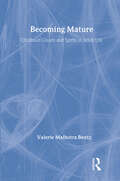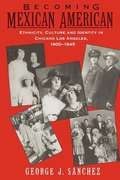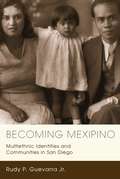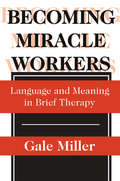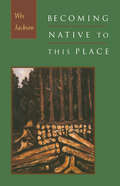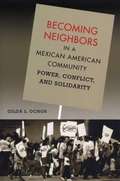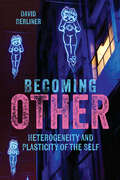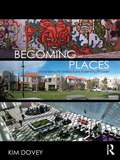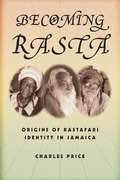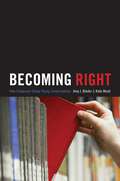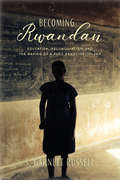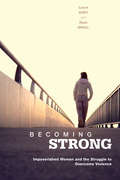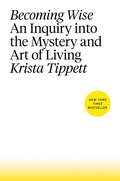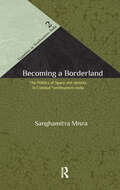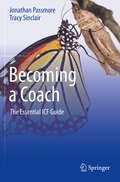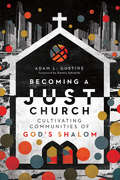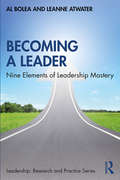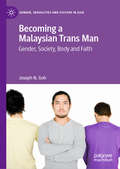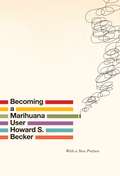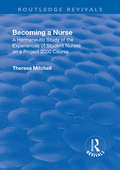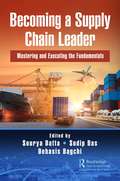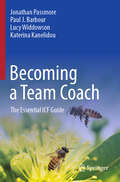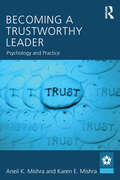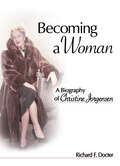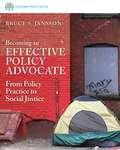- Table View
- List View
Becoming Mature: Childhood Ghosts and Spirits in Adult Life (Communication & Social Order)
by Valerie BentzPresents an integrated theory of development and maturation focusing on the influence of childhood experience on adult women. The book draws on the theories of Mead, Habermas, and Schutz, and on narratives and group discussions to analyze case studies.
Becoming Mexican American: Ethnicity, Culture, and Identity in Chicano Los Angeles, 1900-1945
by George J. SanchezTwentieth-century Los Angeles has been the locus of one of the most profound and complex interactions between variant cultures in American history. Yet this study is among the first to examine the relationship between ethnicity and identity among the largest immigrant group to that city. By focusing on Mexican immigrants to Los Angeles from 1900 to 1945, George J. Sánchez explores the process by which temporary sojourners altered their orientation to that of permanent residents, thereby laying the foundation for a new Mexican-American culture. Analyzing not only formal programs aimed at these newcomers by the United States and Mexico, but also the world created by these immigrants through family networks, religious practice, musical entertainment, and work and consumption patterns, Sánchez uncovers the creative ways Mexicans adapted their culture to life in the United States. When a formal repatriation campaign pushed thousands to return to Mexico, those remaining in Los Angeles launched new campaigns to gain civil rights as ethnic Americans through labor unions and New Deal politics. The immigrant generation, therefore, laid the groundwork for the emerging Mexican-American identity of their children.
Becoming Mexipino: Multiethnic Identities And Communities In San Diego
by Rudy P. GuevarraBecoming Mexipino is a social-historical interpretation of two ethnic groups, one Mexican, the other Filipino, whose paths led both groups to San Diego, California. Rudy Guevarra traces the earliest interactions of both groups with Spanish colonialism to illustrate how these historical ties and cultural bonds laid the foundation for what would become close interethnic relationships and communities in twentieth-century San Diego as well as in other locales throughout California and the Pacific West Coast. Through racially restrictive covenants and other forms of discrimination, both groups, regardless of their differences, were confined to segregated living spaces along with African Americans, other Asian groups, and a few European immigrant clusters. Within these urban multiracial spaces, Mexicans and Filipinos coalesced to build a world of their own through family and kin networks, shared cultural practices, social organizations, and music and other forms of entertainment. They occupied the same living spaces, attended the same Catholic churches, and worked together creating labor cultures that reinforced their ties, often fostering marriages. Mexipino children, living simultaneously in two cultures, have forged a new identity for themselves. Their lives are the lens through which these two communities are examined, revealing the ways in which Mexicans and Filipinos interacted over generations to produce this distinct and instructive multiethnic experience. Using archival sources, oral histories, newspapers, and personal collections and photographs, Guevarra defines the niche that this particular group carved out for itself.
Becoming Miracle Workers: Language and Learning in Brief Therapy (Social Problems And Social Issues Ser.)
by Gale MillerBrief therapy is a postmodern treatment mode that treats problems as social constructions, encouraging those seeking treatment to replace personal troubles (negative stories) with new problem-solving skills (positive stories). The significant differences discussed in this book do not involve sociologists and brief therapists. The differences are between brief therapists, on the one hand, and practitioners of psychotherapy and family therapy on the other. One indicator of these is brief therapists' describing the people who seek their services as clients. The terminology may be contrasted with the language of patients used by many other therapists. At the very least, this difference suggests how brief therapy departs from therapy approaches that are based on the medical model.Becoming Miracle Workers takes the reader inside "Northland Clinic," one of the most innovative and important centers of brief therapy in the world. Based on twelve years of research, Miller's book discusses how brief therapy has evolved into its present, postmodern form. He describes the details of brief therapist-client interactions, and the behind-the-scenes discussions among brief therapists about their clients' problems. This readable account of the workings of brief therapy invites readers to sit in on brief therapy sessions, provides them with new understandings of personal troubles as social constructions, and shows how brief therapists help their clients develop new, untroubled, life stories.
Becoming Native to This Place (Blazer Lectures)
by Wes JacksonIn six compelling essays, Wes Jackson lays the foundation for a new farming economy grounded in nature's principles and located in dying small towns and rural communities. Exploding the tenets of industrial agriculture, Jackson seeks to integrate food production with nature in a way that sustains both. His writing is anchored in his work with The Land Institute, lending authenticity to topics that-in the hands of other writers-too often fail to escape the realm of the conceptual.
Becoming Neighbors in a Mexican American Community: Power Conflict and Solidarity
by Ochoa Gilda L.Focusing on the Mexican-origin, working-class city of La Puente in Los Angeles County, California, this book examines Mexican Americans' everyday attitudes toward and interactions with Mexican immigrants—a topic that has so far received little serious study. Using in-depth interviews, participant observations, school board meeting minutes, and other historical documents, Gilda Ochoa investigates how Mexican Americans are negotiating their relationships with immigrants at an interpersonal level in the places where they shop, worship, learn, and raise their families. This research into daily lives highlights the centrality of women in the process of negotiating and building communities and sheds new light on identity formation and group mobilization in the U.S. and on educational issues, especially bilingual education. It also complements previous studies on the impact of immigration on the wages and employment opportunities of Mexican Americans.
Becoming Other: Heterogeneity and Plasticity of the Self
by David BerlinerMost of us are conscious of having a single and stable self, but the self is more fragmented and plastic than we care to think. David Berliner explores the captivating world of identity through an array of astonishing experiences. From Napoleon doppelgangers to Philip Roth's alter-ego Nathan Zukerman and Wonder Woman cosplayers to anthropologists going native, he delves into the kaleidoscopic nature of the self and attempts to understand the heterogenous nature of identity. But Becoming Other also discusses a great cultural controversy of our time: who has the right to play at being whom?
Becoming Places: Urbanism / Architecture / Identity / Power
by Kim DoveyAbout the practices and politics of place and identity formation – the slippery ways in which who we are becomes wrapped up with where we are – this book exposes the relations of place to power. It links everyday aspects of place experience to the social theories of Deleuze and Bourdieu in a very readable manner. This is a book that takes the social critique of built form another step through detailed fieldwork and analysis in particular case studies. Through a broad range of case studies from nationalist monuments and new urbanist suburbs to urban laneways and avant garde interiors, questions are explored such as: What is neighborhood character? How do squatter settlements work and does it matter what they look like? Can architecture liberate? How do monuments and public spaces shape or stabilize national identity?
Becoming Rasta: Origins of Rastafari Identity in Jamaica
by Charles PriceAn exploration into why and how Jamaicans become Rastafari in spite of increasing incrimination of the religionSo much has been written about the Rastafari, yet we know so little about why and how people join the Rastafari movement. Although popular understandings evoke images of dreadlocks, reggae, and marijuana, Rastafarians were persecuted in their country, becoming a people seeking social justice. Yet new adherents continued to convert to Rastafari despite facing adverse reactions from their fellow citizens and from their British rulers.Charles Price draws on in-depth interviews to reveal the personal experiences of those who adopted the religion in the 1950s to 1970s, one generation past the movement's emergence. By talking with these Rastafari elders, he seeks to understand why and how Jamaicans became Rastafari in spite of rampant discrimination, and what sustains them in their faith and identity.Utilizing new conceptual frameworks, Price explores the identity development of Rastafari, demonstrating how shifts in the movement’s identity—from social pariah to exemplar of Blackness—have led some of the elder Rastafari to adopt, embrace, and internalize Rastafari and blackness as central to their concept of self.
Becoming Right: How Campuses Shape Young Conservatives (Princeton Studies in Cultural Sociology #54)
by Kate Wood Amy BinderHow divergent campus cultures affect conservative college studentsConservative pundits allege that the pervasive liberalism of America's colleges and universities has detrimental effects on undergraduates, most particularly right-leaning ones. Yet not enough attention has actually been paid to young conservatives to test these claims—until now. In Becoming Right, Amy Binder and Kate Wood carefully explore who conservative students are, and how their beliefs and political activism relate to their university experiences.Rich in interviews and insight, Becoming Right illustrates that the diverse conservative movement evolving among today’s college students holds important implications for the direction of American politics.
Becoming Rwandan: Education, Reconciliation, and the Making of a Post-Genocide Citizen (Genocide, Political Violence, Human Righ)
by S. Garnett RussellIn the aftermath of the genocide, the Rwandan government has attempted to use the education system in order to sustain peace and shape a new generation of Rwandans. Their hope is to create a generation focused on a unified and patriotic future rather than the ethnically divisive past. Yet, the government’s efforts to manipulate global models around citizenship, human rights, and reconciliation to serve its national goals have had mixed results, with new tensions emerging across social groups. Becoming Rwandan argues that although the Rwandan government utilizes global discourses in national policy documents, the way in which teachers and students engage with these global models distorts the intention of the government, resulting in unintended consequences and undermining a sustainable peace.
Becoming Strong: Impoverished Women and the Struggle to Overcome Violence
by Laura Huey Ryan BrollDrawing on more than 150 in-depth interviews, Becoming Strong: Impoverished Women and the Struggle to Overcome Violence, explores the diverse effects of trauma in the lives of homeless female victims of violence. Laura Huey and Ryan Broll closely examine the negative patterns common to cases of homeless female victims of violence and develop informed solutions for responding to issues that perpetuate cycles of female homelessness. Becoming Strong offers not only a comprehensive examination of trauma and the role it can play in shaping homeless women’s lives, but it also explores how women may recover and develop strategies for coping with traumatic experiences.
Becoming Wise: An Inquiry into the Mystery and Art of Living
by Krista Tippett“The discourse of our common life inclines towards despair. In my field of journalism, where we presume to write the first draft of history, we summon our deepest critical capacities for investigating what is inadequate, corrupt, catastrophic, and failing. The ‘news’ is defined as the extraordinary events of the day, but it is most often translated as the extraordinarily terrible events of the day. And in an immersive 24/7 news cycle, we internalize the deluge of bad news as the norm—the real truth of who we are and what we’re up against as a species. But my work has shown me that spiritual geniuses of the everyday are everywhere. They are in the margins and do not have publicists. They are below the radar, which is broken.” Peabody Award-winning broadcaster and National Humanities Medalist Krista Tippett has interviewed the most extraordinary voices examining the great questions of meaning for our time. The heart of her work on her national public radio program and podcast, On Being, has been to shine a light on people whose insights kindle in us a sense of wonder and courage. Scientists in a variety of fields; theologians from an array of faiths; poets, activists, and many others have all opened themselves up to Tippett's compassionate yet searching conversation. In Becoming Wise, Tippett distills the insights she has gleaned from this luminous conversation in its many dimensions into a coherent narrative journey, over time and from mind to mind. The book is a master class in living, curated by Tippett and accompanied by a delightfully ecumenical dream team of teaching faculty. The open questions and challenges of our time are intimate and civilizational all at once, Tippett says – definitions of when life begins and when death happens, of the meaning of community and family and identity, of our relationships to technology and through technology. The wisdom we seek emerges through the raw materials of the everyday. And the enduring question of what it means to be human has now become inextricable from the question of who we are to each other. This book offers a grounded and fiercely hopeful vision of humanity for this century – of personal growth but also renewed public life and human spiritual evolution. It insists on the possibility of a common life for this century marked by resilience and redemption, with beauty as a core moral value and civility and love as muscular practice. Krista Tippett's great gift, in her work and in Becoming Wise, is to avoid reductive simplifications but still find the golden threads that weave people and ideas together into a shimmering braid. One powerful common denominator of the lessons imparted to Tippett is the gift of presence, of the exhilaration of engagement with life for its own sake, not as a means to an end. But presence does not mean passivity or acceptance of the status quo. Indeed Tippett and her teachers are people whose work meets, and often drives, powerful forces of change alive in the world today. In the end, perhaps the greatest blessing conveyed by the lessons of spiritual genius Tippett harvests in Becoming Wise is the strength to meet the world where it really is, and then to make it better.
Becoming a Borderland: The Politics of Space and Identity in Colonial Northeastern India (Transition in Northeastern India)
by Sanghamitra MisraThis book discusses the politics of space and identity in the borderlands of northeastern India between the early 1800s and the 1930s. Critiquing contemporary post-colonial histories where this region emerges as fragments, this book sees these perspectives as continuing to be entrapped in a civilizational approach to history writing. Beginning in the pre-colonial period where it focuses on the negotiated character of state-formation during the Mughal imperium, the book then enters the space of the colonial where it looks at some of the early interventions of the East India Company. The analysis of markets as transmitters of authority highlights an important argument that the book makes. Peasantization and the introduction of the notion of the sedentary agriculturist as the productive subject also come up for a detailed discussion, along with economic change and property settlements, which are seen as important ways through which the institution of colonial legality got entrenched in the region. Underlining the interface between the political economy and practices of cultural studies, the book also explores the connections between speech, production of counter narratives of historical memory, political culture and economy, with a focus on the cultural production of a borderland identity that was marked by hyphenated existence between proto- 'Bengal' and proto- 'Assam'.
Becoming a Coach: The Essential ICF Guide
by Tracy Sinclair Jonathan PassmoreAuthored by masters in the field of coaching, this book is designed as a course textbook for those studying coaching in general, but with a specific reference to the updated competences introduced by the International Coaching Federation in 2020. It focuses on core coaching skills, knowledge, and developing self-awareness. This is a definitive text for coach training and go-to guide for those undertaking ICF-accredited programs throughout the world.This book helps readers equip themselves with the skills and knowledge needed to develop as a professional coach. It encourages readers to reflect on who they are, what they can do, and how they can enhance their skills. By drawing on the Gold Standard for coach training and the latest coaching research, this book ensures that a trainer's practice is well informed by evidence and is up to the highest professional standards.
Becoming a Just Church: Cultivating Communities of God's Shalom
by Adam L. Gustine Dennis EdwardsStop outsourcing justice! Many local churches don't know what to do about justice. We tend to compartmentalize it as merely a strategy for outreach, and we often outsource it to parachurch justice ministries. While these organizations do good work, individual congregations are left disconnected from God's just purposes in the world. Adam Gustine calls the local church to be just and do justice. He provides a theological vision for our identity as a just people, where God's character and the pursuit of shalom infuses every aspect of our congregational DNA. As we grow in becoming just, the church becomes a prophetic alternative to the broken systems of the world and a parable of God's intentions for human flourishing and societal transformation. This renewed vision for the church leads us into cultivating a just life together—in community, discipleship, worship, and more—extending justice out into the world in concrete ways. Let's hold being and doing together, so we can become just, compassionate communities that restore shalom and bring hope to the world.
Becoming a Leader: Nine Elements of Leadership Mastery (Leadership: Research and Practice)
by Al Bolea Leanne AtwaterBy blending the real-world insights of business executive Al Bolea with tested research findings provided by leadership scholar Leanne Atwater, Becoming a Leader: Nine Elements of Leadership Mastery effectively bridges theory and practice to outline powerful leadership behaviors and teach readers how to become a leader. Based on Bolea’s original "J-Curve" model of leadership, this approachable guide identifies and describes nine essential elements for leadership mastery, including skills such as setting direction, creating key processes, and nurturing behaviors. Each chapter pairs concrete narratives with succinct research synopses to show how to expand the potential of people and organizations. This unique, experiential text engages readers with self-reflection and self-assessment exercises to encourage their development as future leaders. Becoming a Leader: Nine Elements of Leadership Mastery is a must-have resource for practicing managers, consultants, and practitioners, as well as being applicable to graduate and undergraduate courses on leadership.
Becoming a Malaysian Trans Man: Gender, Society, Body and Faith (Gender, Sexualities and Culture in Asia)
by Joseph N. GohThis book explores the fluid, mutable and contingent ways in which transgender men in Malaysia construct their subjectivities. Against the dearth of academic resources on Malaysian trans men, this ground-breaking monograph is rooted in the lived experiences of Malaysian trans men whose vicissitudes have mostly been hidden, silenced and overlooked. Comprising diverse age groups, ethnicities, socio-economic status, educational backgrounds and religious persuasions, these trans men reveal how they navigate life in a country with secular and religious laws that criminalise their embodiments, and the strategies they deploy to achieve self-determination and self-actualisation despite being perceived as aberrant and sinful. This book demonstrates how negotiations with constitutive elements such as gender identity, social interaction, citizenship, legality, bodily struggle, medical transitioning and personal spiritual validation condition the becomings of Malaysian trans men.
Becoming a Marihuana User
by Howard S. BeckerOG Kush. Sour Diesel. Wax, shatter, and vapes. Marijuana has come a long way since its seedy days in the back parking lots of our culture. So has Howard S. Becker, the eminent sociologist, jazz musician, expert on “deviant” culture, and founding NORML board member. When he published Becoming a Marihuana User more than sixty years ago, hardly anyone paid attention—because few people smoked pot. Decades of Cheech and Chong films, Grateful Dead shows, and Cannabis Cups later, and it’s clear—marijuana isn’t just an established commodity, it’s an entire culture. And that’s just the thing—Becker totally called it: pot has everything to do with culture. It’s not a blight on culture, but a culture itself—in fact, you’ll see in this book the first use of the term “users,” rather than “abusers” or “addicts.” Come along on this short little study—now a famous timestamp in weed studies—and you will be astonished at how relevant it is to us today. Becker doesn’t judge, but neither does he holler for legalization, tell you how to grow it in a hollowed-out dresser, or anything else like that for which there are plenty of other books you can buy. Instead, he looks at marijuana with a clear sociological lens—as a substance that some people enjoy, and that some others have decided none of us should. From there he asks: so how do people decide to get high, and what kind of experience do they have as a result of being part of the marijuana world? What he discovers will bother some, especially those who proselytize the irrefutably stunning effects of the latest strain: chemistry isn’t everything—the important thing about pot is how we interact with it. We learn to be high. We learn to like it. And from there, we teach others, passing the pipe in a circle that begins to resemble a bona fide community, defined by shared norms, values, and definitions just like any other community. All throughout this book, you’ll see the intimate moments when this transformation takes place. You’ll see people doing it for the first time and those with considerable experience. You’ll see the early signs of the truths that have come to define the marijuana experience: that you probably won’t get high at first, that you have to hold the hit in, and that there are other people here who are going to smoke that, too.
Becoming a Nurse: A Hermeneutic Study of the Experiences of Student Nurses on a Project 2000 Course (Routledge Revivals)
by Theresa MitchellThis title was first published in 2002: Presenting revealing insights into the structure and functioning of the Project 2000 courses, this book examines the original, creative and evolutionary research processes which led to the identification of student nurses’ unique and common experiences, and portrays the learning milieu in which students developed a self-concept of being a nurse. Employing Heidegger’s hermeneutic phenomenological approach, the book explores the concepts of intentionality, thrownness, being-in-the-world-with-others, temporality and active subject . It represents a substantial contribution to existing knowledge concerning student reflection and development, forms of teaching, leadership and supervision, and student exposure to a variety of experiences in clinical practice. It also contributes important new perspectives both to ongoing discussions related to socialization theory and to the qualitative methodology literature.
Becoming a Supply Chain Leader: Mastering and Executing the Fundamentals
by Sourya DattaThe book explains how to emerge and grow as a supply chain leader and details supply chain and procurement processes and operational activities in real-work scenarios across multiple supply chain verticals. The book defines what an entry-level supply chain professional must do to excel in various types of supply chain verticals such as IT, electronics manufacturing, pharmaceutical, retail, and consumer goods. Apart from helping professionals understand vertical specific nuances, this book helps them to set both short-term goals for annual performance review and longer-term career planning. In addition, for a mid- or senior-level supply chain professional, the book offers ideas on ways to launch initiatives and demonstrate leadership to foster career growth. It offers ideas about unlocking new values for the organization and creating a data-driven decision support platform to gain financial efficiency for better management of CapEx and OpEx spend, thus improving the bottom line. The book includes a tool kit which includes operational data models, financial models, and presentation templates for creating and socializing proposals intended for cross-functional teams and demonstrating supply chain leadership. The book is divided into four major parts. In Part I, the book starts with an overview of key concepts in a manufacturing supply chain and procurement organization. It describes current forms of modern global supply chain and corporate procurement organizations. The objective of Part II is to provide a framework for a self-directed supply chain manager to understand how a large organization evaluates the contribution of supply chain managers and where it expects them to create value. To foster career growth as a supply chain professional, the book identifies six key knowledge pillars for demonstrating supply chain mastery: Technical and market knowledge of the end product and its constituents. Knowledge of internal product development and sustaining processes and supporting consumption data. Health and market condition of the supplier. Ability to create value. Ability to build internal and external executive relationships with key influencers. Ability to obtain best cost without compromising on quality and lead time. Negotiating cost, sourcing material, and then the logistics of moving the raw material through multiple stages and finally finished materials across the globe are some of the key areas which need continuous improvement. As a sentinel of efficiency, removing any kind of wastage leads to immediate value creation and contributes to the margin by improving the bottom line. In Part III, the book reviews twelve such verticals namely printer, medical, IT, energy, automotive, cloud, dairy, data management, avionics, biotech, apparel and start up and the supply chain nuances through the lenses of the framework created in Part II. In Part IV, the book goes back to focus on the professional growth of an individual supply chain person in an industry agnostic way. It provides examples of financial and operational efficiencies that a supply chain professional can create.
Becoming a Team Coach: The Essential ICF Guide
by Jonathan Passmore Lucy Widdowson Paul J. Barbour Katerina KanelidouHow can you become the best team coach you can be? Written by highly experienced and award-winning authors and speakers, this book will help to equip you with the skills and knowledge you need to develop yourself as a professional team coach. It will encourage you to reflect on who you are, what you do and how you can enhance your skills. By drawing on the Gold Standard for team coach training and the latest coaching research, it will ensure your practice is both well informed by evidenced and up to the highest professional standards. The book will also help you as you undertake a team coaching training program, as part of ICF team coaching development. “Becoming a Team Coach is a critical resource created by top executive coaches that offers a cumulation of the authors’ experience and knowledge in the field. This guide provides practical frameworks and expert advice for both new and experienced coaches and combines theory with real-world applications for the most effective teaching. Whether you're just beginning or looking to refine your skills, this guide will help you make a significant impact.” Dr. Marshall Goldsmith is the Thinkers50 #1 Executive Coach and New York Times bestselling author of The Earned Life, Triggers, and What Got You Here Won’t Get You There. “Team coaching is a fast-growing phenomenon in the professional coaching field. Yet, there are still some misunderstandings, lack of clarity and frankly some mis-information. This book is a great resource for anybody who is interested in either being trained in team coaching or engaging this service for their organization. Easy to navigate and very practical, it is a real comprehensive resource for all.” Magdalena Nowicka Mook, CEO International Coaching Federation “As the world of coaching evolves, learning how to be a team coach is both a survival strategy for practitioners and a way to add more value to clients. While competencies have a role to play, the core skill is to move beyond them --- this book maps out how to achieve this”. David Clutterbuck
Becoming a Trustworthy Leader: Psychology and Practice (Leadership: Research and Practice)
by Aneil K. Mishra Karen E. MishraIt's time to discover a new way for individuals to lead organizations and societies. Trust in a variety of institutions, including governmental and business, is at an all-time low. In order to strengthen society from its foundations, we need to rebuild trust. Research shows that leaders are critical to building trust in organizations, and that trust in leadership is significantly related to a number of attitudes, behaviors and performance outcomes. This new book, with its emphasis on the critical role of leadership in trust-building as well as the novel perspective on the trust circle of leadership, will be of interest to all students and researchers studying leadership, management and organizational behavior.
Becoming a Woman: A Biography of Christine Jorgensen
by Richard Docter FDiscover the remarkable woman behind the legend.Discover Christine Jorgensen’s remarkable, inspirational journey to become the woman she always knew she should have been. Becoming a Woman: A Biography of Christine Jorgensen provides fascinating insights about the woman who opened doors—and minds—on behalf of sexual minorities. This book chronicles Christine’s drive, ability to solve problems, immense determination, and just plain luck as she transformed herself into her true gender—and reveals facets of her personality previously undisclosed by other biographies of her life.Christine Jorgensen was a major contributor to the unfolding of the so-called sexual revolution in America. Becoming a Woman: A Biography of Christine Jorgensen is the story of one courageous individual overcoming personal and social barriers, enduring the difficult compromises that needed to be made, and the ultimate realization of goals. This revealing warts-and-all biography tells Christine’s real story while examining the history of transsexuality in western societies, the medical intervention provided to her, and insightful profiles of Alfred C. Kinsey, Georges Burou, Harry Benjamin, and Christian Hamburger. The appearance and characteristics of cross dressers are also discussed, as well as their lifestyles are contrasted with transsexual persons. This biography serves to illustrate the challenge to lessen discrimination against all LGBT persons—and the struggle that still lies ahead. Becoming a Woman: A Biography of Christine Jorgensen explores: the supportive and high functioning family in which Christine grew up Jorgensen’s struggle with homosexual feelings deemed unacceptable by society Jorgensen’s young adult years while presenting as a man the steps in his/her transsexual self-identification Jorgensen’s determination to redefine himself/herself through medical intervention why Dr. Christian Hamburger in Copenhagen took an interest in Jorgensen’s case the previously unrevealed story of Jorgensen’s revelations to a news reporter that led to international headlines how Jorgensen developed a profitable nightclub act the conflicts that accompanied the writing and publication of her autobiography Jorgensen’s love/hate personality characteristic and its effect on personal relationships much more!Becoming a Woman: A Biography of Christine Jorgensen is eye-opening, thought-provoking reading perfect for transsexuals and prospective transsexuals; those who identify as gay, lesbian, bisexual, or as cross dressers; mental health professionals; sociologists; educators; students; social workers; civil rights attorneys; and cultural anthropologists.
Becoming an Effective Policy Advocate: From Policy Practice to Social Justice, 7th Edition
by Bruce S. JanssonThe seventh edition’s coverage includes discussion of such events and issues as Barack Obama’s presidency, the Occupy Wall Street movement, the Arab Spring, and more. By going beyond the traditional foundational approach to policy, this groundbreaking text helps you develop the skills you need to become an advocate for social change.
